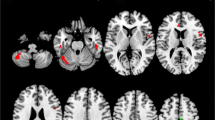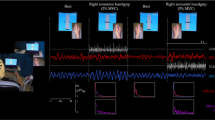Abstract
Motor control demands coordinated excitation and inhibition across distributed brain neuronal networks. Recent work has suggested that multiple sclerosis (MS) may be associated with impairments of neuronal inhibition as part of more general progressive impairments of connectivity. Here, we report results from a prospective, multi-centre fMRI study designed to characterise the changes in patients relative to healthy controls during a simple cued hand movement task. This study was conducted at eight European sites using 1.5 Tesla scanners. Brain deactivation during right hand movement was assessed in 56 right-handed patients with relapsing-remitting or secondary progressive MS without clinically evident hand impairment and in 60 age-matched, healthy subjects. The MS patients showed reduced task-associated deactivation relative to healthy controls in the pre- and postcentral gyri of the ipsilateral hemisphere in the region functionally specialised for hand movement control. We hypothesise that this impairment of deactivation is related to deficits of transcallosal connectivity and GABAergic neurotransmission occurring with the progression of pathology in the MS patients. This study has substantially extended previous observations with a well-powered, multicentre study. The clinical significance of these deactivation changes is still uncertain, but the functional anatomy of the affected region suggests that they could contribute to impairments of motor control.



Similar content being viewed by others
Abbreviations
- EDSS:
-
Extended Disability Status Score
- EPI:
-
Echoplanar image
- fMRI:
-
Functional MRI
- MNI:
-
Montreal Neurological Institute
- PMd:
-
Dorsal premotor cortex
- ROI:
-
Region of interest
References
Allison JD, Meador KJ, Loring DW, Figueroa RE, Wright JC (2000) Functional MRI cerebral activation and deactivation during finger movement. Neurology 54:135–142
Amunts K, Janke L, Mohlberg H, Steinmetz H, Zilles K (2000) Interhemispheric asymmetry of the human motor cortex related to handedness and gender. Neuropsychologia 38:304–312
Au Duong MV, Audoin B, Boulanouar K, Ibarrola D, Malikova I, Confort-Gouny S et al (2005) Altered functional connectivity related to white matter changes inside the working memory network at the very early stage of MS. J Cereb Blood Flow Metab 25:1245–1253
Audoin B, Ibarrola D, Ranjeva JP, Confort-Gouny S, Malikova I, Ali-Cherif A et al (2003) Compensatory cortical activation observed by fMRI during a cognitive task at the earliest stage of MS. Hum Brain Mapp 20:51–58
Beckmann CF, DeLuca M, Devlin JT, Smith SM (2005) Investigations into resting-state connectivity using independent component analysis. Philos Trans R Soc Lond B Biol Sci 360:1001–1013
Bell EC, Willson MC, Wilan AH, Dave S, Silverstone PH (2006) Males and females differ in brain activation during cognitive tasks. Neuroimage 30:529–538
Cader S, Cifelli A, Abu-Omar Y, Palace J, Matthews PM (2006) Reduced brain functional reserve and altered functional connectivity in patients with multiple sclerosis. Brain 129:527–537
Cader S, Johansen-Berg H, Wylezinska M, Palace J, Behrens TE, Smith S, Matthews PM (2007) Discordant white matter N-acetylasparate and diffusion MRI measures suggest that chronic metabolic dysfunction contributes to axonal pathology in multiple sclerosis. Neuroimage 36(1):19–27
De Luca M, Beckmann CF, De Stefano N, Matthews PM, Smith SM (2006) fMRI resting state networks define distinct modes of long-distance interactions in the human brain. Neuroimage 15(29):1359–1367
Dutta R, McDonough J, Yin X, Peterson J, Chang A, Torres T et al (2006) Mitochondrial dysfunction as a cause of axonal degeneration in multiple sclerosis patients. Ann Neurol 59:478–489
Filippi M, Rocca MA, Falini A, Caputo D, Ghezzi A, Colombo B et al (2002) Correlations between structural CNS damage and functional MRI changes in primary progressive MS. Neuroimage 15:537–546
Filippi M, Rocca MA, Mezzapesa DM, Falini A, Colombo B, Scotti G et al (2004a) A functional MRI study of cortical activations associated with object manipulation in patients with MS. Neuroimage 21:1147–1154
Filippi M, Rocca MA, Mezzapesa DM, Ghezzi A, Falini A, Martinelli V et al (2004b) Simple and complex movement-associated functional MRI changes in patients at presentation with clinically isolated syndromes suggestive of multiple sclerosis. Hum Brain Mapp 21:108–117
Filippi M, Rocca MA (2005) MRI evidence for multiple sclerosis as a diffuse disease of the central nervous system. J Neurol 252(Suppl 5):v16–v24
Forman SD, Cohen JD, Fitzgerald M, Eddy WF, Mintun MA, Noll DC (1995) Improved assessment of significant activation in functional magnetic resonance imaging (fMRI): use of a cluster-size threshold. Magn Reson Med 33:636–647
Greicius MD, Srivastava G, Reiss AL, Menon V (2004) Default-mode network activity distinguishes Alzheimer’s disease from healthy aging: evidence from functional MRI. Proc Natl Acad Sci USA 101:4637–4642
Jenkinson M, Smith S (2001) A global optimisation method for robust affine registration of brain images. Med Image Anal 5:143–156
Jenkinson M, Bannister P, Brady M, Smith S (2002) Improved optimization for the robust and accurate linear registration and motion correction of brain images. Neuroimage 17:825–841
Kurtzke JF (1983) Rating neurologic impairment in multiple sclerosis: an expanded disability status scale (EDSS). Neurology 33:1444–1452
Lee MA, Smith S, Palace J, Narayanan S, Silver N, Minicucci L, Filippi M, Miller DH, Arnold DL, Matthews PM (1999) Spatial mapping of T2 and gadolinium-enhancing T1 lesion volumes in multiple sclerosis: evidence for distinct mechanisms of lesion genesis? Brain 122(Pt 7):1261–1270
Lee M, Reddy H, Johansen-Berg H, Pendlebury S, Jenkinson M, Smith S et al (2000) The motor cortex shows adaptive functional changes to brain injury from multiple sclerosis. Ann Neurol 47:606–613
Lenzi D, Conte A, Mainero C, Fasca V, Fubelli F, Totaro P, Caramia F, Inghilleri M, Pozzilli C, Pantano P (2007) Effects of corpus callosum damage on ipsilateral motor activation in patients with multiple sclerosis: a functional and anatomical study. Hum Brain Mapp 28:636–644
Leocani L, Colombo B, Magnani G, Martinelli-Boneschi F, Cursi M, Rossi P et al (2001) Fatigue in multiple sclerosis is associated with abnormal cortical activation to voluntary movement—EEG evidence. Neuroimage 13:1186–1192
MacKiernan KA, Kaufman JN, Kucera-Thompson J, Binder JR (2003) A parametric manipulation of factors affecting task-induced deactivation in functional neuroimaging. J Cogn Neurosci 15:294–408
Manson SC, Palace J, Frank JA, Matthews PM (2006) Loss of interhemispheric inhibition in patients with multiple sclerosis is related to corpus callosum atrophy. Exp Brain Res 174:728–733
Mason MF, Norton MI, Van Horn JD, Wegner DM, Grafton ST, Macrae CN (2007) Wandering minds: the default network and stimulus-independent thought. Science 315(5810):393–395
Morgan K, Sammer G, Courtney SM, Wolters T, Melchior H, Blecker CR, Oschmann P, Kaps M, Vaitl D (2007) Distinct mechanisms of altered brain activation in patients with multiple sclerosis. Neuroimage 37:937–946
Pantano P, Iannetti GD, Caramia F, Mainero C, Di Legge S, Bozzao L et al (2002a) Cortical motor reorganization after a single clinical attack of multiple sclerosis. Brain 125:1607–1615
Pantano P, Mainero C, Iannetti GD, Caramia F, Di Legge S, Piattella MC et al (2002b) Contribution of corticospinal tract damage to cortical motor reorganization after a single clinical attack of multiple sclerosis. Neuroimage 17:1837–1843
Pantano P, Mainero C, Lenzi D, Caramia F, Iannetti GD, Piattella MC et al (2005) A longitudinal fMRI study on motor activity in patients with multiple sclerosis. Brain 128:2146–2153
Poser CM, Paty DW, Scheinberg L, McDonald WI, Davis FA, Ebers GC, Johnson KP, Sibley WA, Silberberg DH, Tourtellotte WW (1983) New diagnostic criteria for multiple sclerosis: guidelines for research protocols. Ann Neurol 13:227–231
Raichle ME (1998) The neural correlates of consciousness: an analysis of cognitive skill learning. Philos Trans R Soc Lond B Biol Sci 353:1889–1901
Reddy H, Narayanan S, Arnoutelis R, Jenkinson M, Antel J, Matthews PM et al (2000a) Evidence for adaptive functional changes in the cerebral cortex with axonal injury from multiple sclerosis. Brain 123(Pt 11):2314–2320
Reddy H, Narayanan S, Matthews PM, Hoge RD, Pike GB, Duquette P et al (2000b) Relating axonal injury to functional recovery in MS. Neurology 54:236–239
Reddy H, Narayanan S, Woolrich M, Mitsumori T, Lapierre Y, Arnold DL et al (2002) Functional brain reorganization for hand movement in patients with multiple sclerosis: defining distinct effects of injury and disability. Brain 125:2646–2657
Rocca MA, Falini A, Colombo B, Scotti G, Comi G, Filippi M (2002a) Adaptive functional changes in the cerebral cortex of patients with nondisabling multiple sclerosis correlate with the extent of brain structural damage. Ann Neurol 51:330–339
Rocca MA, Matthews PM, Caputo D, Ghezzi A, Falini A, Scotti G et al (2002b) Evidence for widespread movement-associated functional MRI changes in patients with PPMS. Neurology 58:866–872
Rocca MA, Gavazzi C, Mezzapesa DM, Falini A, Colombo B, Mascalchi M et al (2003a) A functional magnetic resonance imaging study of patients with secondary progressive multiple sclerosis. Neuroimage 19:1770–1777
Rocca MA, Mezzapesa DM, Falini A, Ghezzi A, Martinelli V, Scotti G et al (2003b) Evidence for axonal pathology and adaptive cortical reorganization in patients at presentation with clinically isolated syndromes suggestive of multiple sclerosis. Neuroimage 18:847–855
Rocca MA, Gallo A, Colombo B, Falini A, Scotti G, Comi G et al (2004) Pyramidal tract lesions and movement-associated cortical recruitment in patients with MS. Neuroimage 23:141–147
Rocca MA, Colombo B, Falini A, Ghezzi A, Martinelli V, Scotti G et al (2005) Cortical adaptation in patients with MS: a cross-sectional functional MRI study of disease phenotypes. Lancet Neurol 4:618–626
Rombouts SA, Barkhof F, Goekoop R, Stam CJ, Scheltens P (2005) Altered resting state networks in mild cognitive impairment and mild Alzheimer’s disease: an fMRI study. Hum Brain Mapp 26:231–239
Shmuel A, Augath M, Oeltermann A, Logothetis NK (2006) Negative functional MRI response correlates with decreases in neuronal activity in monkey visual area V1. Nat Neurosci 9(4):569–577
Stefanovic B, Warnking JM, Pike GB (2004) Hemodynamic and metabolic responses to neuronal inhibition. Neuroimage 22:771–778
Woolrich MW, Behrens TE, Beckmann CF, Jenkinson M, Smith SM (2004) Multilevel linear modelling for FMRI group analysis using Bayesian inference. Neuroimage 21:1732–1747
Yousry TA, Schmid UD, Alkadhi H, Schmidt D, Peraud A, Buettner A et al (1997) Localization of the motor hand area to a knob on the precentral gyrus. A new landmark. Brain 120(Pt 1):141–157
Acknowledgments
PMM thanks the MRC (UK) and the MS Society of Great Britain and Northern Ireland for support. PMM is an employee of GlaxoSmithKline. The design and preparation of this review were done under the auspices of the European Community network for Magnetic Resonance research in MS (MAGNIMS).
Author information
Authors and Affiliations
Corresponding author
Rights and permissions
About this article
Cite this article
Manson, S.C., Wegner, C., Filippi, M. et al. Impairment of movement-associated brain deactivation in multiple sclerosis: further evidence for a functional pathology of interhemispheric neuronal inhibition. Exp Brain Res 187, 25–31 (2008). https://doi.org/10.1007/s00221-008-1276-1
Received:
Accepted:
Published:
Issue Date:
DOI: https://doi.org/10.1007/s00221-008-1276-1




